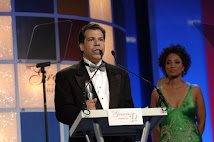Depending on how you look at it, the economic downturn could be either good or bad news for you if you are in the syndication business. On the plus side, take a look at all the cuts being made by the major broadcast companies and it would appear that the time is ripe for syndcation, and that EVERY syndicated product or program will flourish as a result of the need to cut costs and improve effeciencies.
On the other hand, the downturn also means that people are going to be far more cautious and possibly less likely to take a chance on something new and unproven. Case in point:
I got the bad news this week that a couple of my friends who were working for a start-up network were all sacked with about 24 hours notice. Even more of an insult, the company attorney, rather than the president of the company did the firing as the business unceremoniously closed its doors. Talk about lousy.
Would this particular company have made it in better times. I don't think so. Without knowing anything about their financial health, from the outside it was a recipe for disaster: A programming concept that was unclear, marketing that was poorly executed and no real reason to exist. The programs had no proven track record. Could it have been fixed. Possibly. I think there are a few things that might have changed their lot in life and I'll talk about that in my next post.
Here’s what AI means for your SEO.
1 week ago




